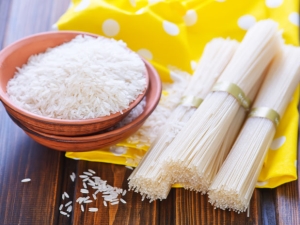Calorie and nutritional value of rice noodles

Rice is eaten daily by millions of people. And to diversify it, a number of interesting options have been invented. One of them is rice noodles.
Features and chemical composition
The calorie content of uncooked rice noodles is 363 calories per 100 grams. In the same volume of the product there is:
- 81 g of carbohydrates;
- 3.4 g proteins;
- just over 0.5 g of fat.
This type of food is rich in vitamins of group D, there is also a tangible amount of vitamin E. Of the inorganic components, attention is drawn to:
- potassium;
- iron;
- phosphorus;
- manganese;
- calcium.


After cooking
Even an inexperienced person will easily understand that raw rice noodles can hardly be called a dietary standard in terms of the number of kcal. But everything changes when it is boiled. Ready-made boiled rice noodles have an energy value of only 120 kcal per 100 g. There is nothing supernatural in this: just a portion of boiled noodles is saturated with water, it is an ordinary broth.

Useful or not?
Calorie content is very important to know, no one argues with that. But it is impossible to evaluate the usefulness of the product only on it. And with the benefit of just rice noodles, everything is in order. Even the small amount of protein that is included in the BJU formula does not include gluten. Therefore, the risk of malfunctioning of the stomach and the appearance of food allergies is minimal. There is absolutely no fiber in rice noodles.
The increased concentration of vitamin E promotes health and maintains a youthful appearance of the skin.And vitamins from group B are valuable for effective support of the nervous system. They also turn out to be good antioxidants.
The relatively low nutritional value of the product allows us to recommend it as a replacement for classic pasta. Yes, it supplies the body with a large amount of carbohydrates. But they all belong to the “complex” group, that is, they split for a long time, stabilizing the energy balance.
More importantly, all these carbohydrates will not affect the glycemic index of food. Therefore, they can be safely used by patients with diabetes, and those who have a predisposition to this disease.


As for the risk associated with eating rice noodles, for the most part, the product itself is not to blame. Problems arise when it is combined with:
- meat;
- especially oily fish;
- mayonnaise and dressings based on mayonnaise.
This automatically removes the rice product from the list of dietary foods. There are constipations, bloating is observed. Other problems with the stomach and intestines are also possible. In addition, excessive passion for rice noodles can be harmful. The abundance of "slow" carbohydrates can cause overweight.
It is not recommended to use rice noodles for young children, as well as for the elderly.


Consumer characteristics
Rice noodles are usually white in appearance, although a translucent variety is also found. The width of the noodles varies from 2 to 30 mm, while its minimum length is 0.5 m. A quality product does not break during the cooking process. The presence of a slight gray tint is a normal variant, while rice noodles should not be cloudy, collected in lumps or replete with extraneous flavors.


Tips
If you want to cook rice noodles, but don't want to get a shapeless lump instead of a delicious dish, it is recommended to use these tips.
- To boil the noodles for salad, place them in a bowl, cover with boiling water and stir. Let stand for five minutes, then drain the boiling water and pour over with cold water.
- If you are making soup, boil the noodles in lightly salted water for about 4 minutes. Then the product is laid out in a colander and doused with cool water.
- When cooking vegetables in a pan, it's a good idea to add some noodles to them. You don't need to boil it, it's better to steam it. Place raw rice in boiling water and after five minutes mix with half-cooked vegetables in a pan.
For more on how to make rice noodles, watch the video below.

















